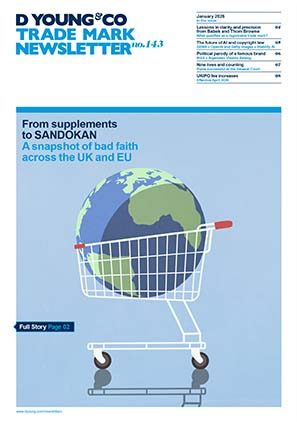Establishing genuine use of business and retail services: Habitat’s class 35 services revoked on appeal
Habitat is a furniture and home furnishings company. It sells goods online and in stores across the EU. Habitat had an EU trade mark registration for a figurative mark containing “Habitat” for various goods in various classes and for services in class 35 such as retailing in shops of furniture and decorative articles, business services, advertisement services, franchising, and decoration of shop windows.
Habitat responded to an application to revoke its registration in its entirety, filing hundreds of documents, including press files, catalogues, third party articles, receipts, website screenshots, newsletters, evidence of delivery trucks and franchise agreements.
At first instance, Habitat managed to retain the registration for the majority of the goods, however, the Cancellation Division revoked the class 35 specification in its entirety. Despite the fact that Habitat had submitted “very voluminous evidence” showing that it was involved in selling a range of different goods, it had not demonstrated trade mark use in relation to any of the class 35 services.
Why were the class 35 services revoked?
In making its decision the Cancellation Division referred to the explanatory note of the Nice Classification, which provides that the concept of “retail services” relates to three essential characteristics:
- the purpose of retail services is the sale of goods to consumers;
- they are addressed to consumers with a view to enabling them to conveniently view and purchase the goods; and
- they are provided for the benefit of others.
The Cancellation Division commented that, in the same way that advertising one’s own goods does not constitute use for advertising services, there is no use for retail services where the manufacturer is merely selling its own goods from its shop or website.
Such activity is not an independent service but an activity covered by the protection conferred by registration for the goods. Consequently, it would not be appropriate to equate the protection conferred by registration for goods in any of classes 1 to 34 with that conferred by registration for class 35 retail services. The evidence merely showed that Habitat was selling its own goods and carrying out its own business and admin services in relation to its own business: it was not providing any services to third parties.
The appeal
Habitat appealed the decision to revoke its class 35 specification to the Board of Appeal. Arguments were split in relation to retail services and the remaining more business-like services.
Retail services
Habitat highlighted that it sold not only its own goods but also goods from independent designers who created products for Habitat to sell. Essentially, it argued that it was not a manufacturer but a retailer of goods of different independent designers and other third-party companies. Therefore, the sale services provided should be considered as retail services. However, the Board of Appeal found that “Habitat” was affixed to all such goods and so the reference to independent designers would be seen a product range designation, that is, the name of a collection, which is common in trade industry. Consumers would still regard “Habitat” only as the badge of origin.
More business-like services
Despite the extensive use of the mark, and the fact that there were signed franchise agreements with companies and designers for the distribution of products, there was no use of the mark in relation to the business services. The services were carried out to benefit the sale of “Habitat” goods and for the management of Habitat’s own business. The services were not provided for the benefit of third parties, as an independent service, but in order for the proprietor to organise sales of its own goods under the mark “Habitat”. These activities were encompassed by the trade mark protection given for those goods. Consequently, the appeal was dismissed.
Conclusion
This decision highlights that to demonstrate genuine use of a mark in relation to class 35 services, the evidence must demonstrate that the services are provided under the mark for the benefit of others (clients). Carrying out your own business and selling your own goods does not constitute use of a mark in relation to class 35, since it does not constitute an independent service but an ancillary activity.
The function of a trade mark is to act as a badge of origin: when a business is conducting services for its own benefit, consumers will not have the opportunity to perceive the business as providing such services under the mark, such that they will need to rely on the mark as a badge of origin for that service.
Case details at a glance
Jurisdiction: European Union
Decision level: Board of Appeal
Parties: Habitat International SA v Bachmann GmbH
Citation: R 870/2023-2
Date: 12 December 2023

